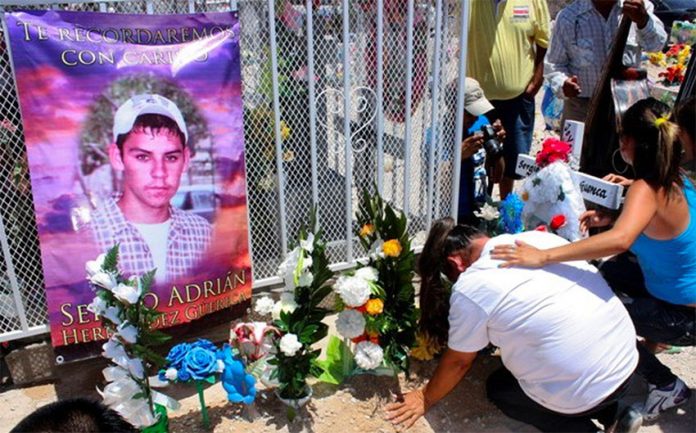The federal government has expressed regret about a ruling by the United States Supreme Court that prevents the family of a teenage boy who was killed in Ciudad Juárez, Chihuahua, in 2010 from suing the U.S. border patrol agent who shot him.
In a statement issued by the Ministry of Foreign Affairs (SRE), the government said that it was deeply concerned about the effects that the February 25 ruling will have on similar cases in which Mexicans died on their side of the border after being shot by border patrol agents from the U.S. side.
“With this precedent, such cases could now face limitations in demanding justice and compensation in courts of that country,” the SRE statement said.
Sergio Adrián Hernández Güereca, 15, was shot in June 2010 by Jesús Mesa, a border patrol agent who was on duty in El Paso, Texas. Mesa was on a bicycle patrol when he was alerted to the presence of people smugglers, the BBC reported.
Hernández and a group of his friends were in the dried-up concrete bed of the Rio Grande at the time.
According to the youth’s family, Hernández and his friends were daring each other to run across the unmarked international border in the middle of the culvert built to contain the river, and touch a fence on the U.S. side.
Mesa detained one of the boys for illegally crossing the border but Hernández and another youth returned to the Mexican side and hid behind a pillar. The 15-year-old was shot twice as he peeked out from behind the pillar.
U.S. authorities ruled that the border agent had acted in self-defense even though they found no evidence that Hernández had thrown stones at him as he claimed.
Mexican authorities charged Mesa with murder but the United States refused to extradite him. Hernández’s parents subsequently attempted to sue the border agent in the United States for violating the U.S. Constitution by using excessive force.
Lower courts dismissed their claim before the case reached the U.S. Supreme Court on Tuesday. The justices divided five to four along conservative-liberal lines to uphold the lower courts’ decision.
The conservative justices argued that “a cross-border shooting is by definition an international incident” and therefore should be solved diplomatically rather than legally. Allowing the boy’s parents to pursue compensation in the United States would have implications on foreign relations and national security, they said.
Writing for the majority, Justice Samuel A. Alito Jr. said that Hernández’s parents couldn’t sue Mesa without congressional approval.
Ruth Bader Ginsberg, one of the dissenting judges, said that the border agent’s “allegedly unwarranted deployment of deadly force occurred on United States soil” and that it did not make sense to dismiss the parents’ claim because the bullet ended up on the Mexican side of the border.
A lawyer for the family said that the ruling would “promote a Wild West attitude” on the U.S.-Mexico border.
“To be left with no remedy … given such a violent and unprovoked shooting, weakens the constitutional foundation of America’s house,” Robert Hilliard said.
In the SRE statement, the government said that it would continue to provide assistance to all Mexicans affected by cross-border incidents. It also noted that Mexico and the United States formed a border violence prevention group in 2014 that has met on six occasions and made progress on issues such as accountability and transparency.
